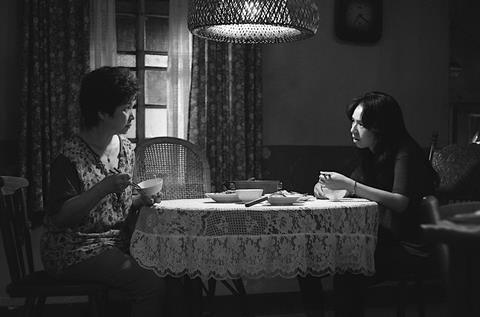Kimi Hsia Yu-chiao and Yang Kuei-mei impress in this striking black-and-white Taiwanese mother-daughter drama

Dir/scr: Tom Lin Shu-yu. Taiwan. 2024. 108mins
A mother and daughter struggle to heal their relationship after a difficult past in Taiwanese filmmaker Tom Lin Shu-yu’s poignant black and white drama. Leaning into both the pain and the dark comedy of this fractured family as it attempts to put itself back together, Yen And Ai-Lee benefits greatly from performances from Kimi Hsia and Yang Kuei-mei alongside monochromatic visuals that throw the emotion of the story into sharp relief.
Monochromatic visuals throw the emotion of the story into sharp relief
Having premiered in Busan’s Jeosok strand, Yen And Ai-Lee will open in Taiwan on October 10. Nominated for eight Golden Horse Awards including nods for both central performances (Lin’s previous film, 2019’s The Garden Of Evening Mists, received nine nominations), the film should certainly find favour with a domestic audience. Further afield, it could well draw the attention of a specialist streamer.
Yen And Ai-Lee opens with a striking sequence, which showcases the deep, textural black-and-white cinematography of Kartik Vijay (returning from The Garden Of Evening Mists) and the considerable screen presence of Hsia, a Taiwanese actress best know for her rom-coms who puts in a raw performance here. A long-shot takes in a nighttime street in a small rural Taiwanese village, still and quiet. A woman on a bicycle suddenly rides into frame, stopping directly in front of the camera to stare down its lens, panic-stricken, covered in blood and holding a knife.
The story is not, however, about this traumatic event, rather its impact. We immediately move forward eight years as Yen (Hsia), the woman on the bicycle, is released from prison after serving time for a crime that is slowly revealed over the course of the film, and returns to live with her mother Ai-Lee (veteran Taiwanese actress Yang). Despite Ai-Lee’s joy at having her daughter home, there is a distance between them, captured in their stilted conversation and the awkwardness of their physical interactions — neither quite remembers how to share a space with the other. Much of Lin’s screenplay is about things not said, long-held resentments bubbling under the surface, occasionally resulting in explosive moments before being pushed back down.
The film then shifts a gear, moving to the experiences of a reserved young woman named Allie (also played by Hsia) at a community college drama class in the city of Kaohsiung, overseen by a woman who used to be a ‘wailing filial daughter’ — hired by families to encourage mourners to cry at funerals. As Allie slowly learns to open up and let herself go, editor Tom Lin Hsin-ming smoothly cuts between these classes and the central story (with the help of chapter headings), allowing the link between the two to emerge organically.
Yet it’s no great mystery as to what is going on, and neither does Lin intend the dual narratives to be anything more complicated than two halves of a whole, both in service to the shifting sands of this mother-daughter relationship. This intensely emotional premise is heightened further when Yen’s young half-brother Wei (I-le Hsieh) — the product of an affair her father had before his death — is foisted on them by his mother, shortly before she does a disappearing act.
Vijay’s black-and-white aesthetic is a world away from the sepia tint of nostalgia; rich, crisp and sharply defined, it works in tandem with Penny Tsai Pei-ling’s warm production design to emphasise the fact that these are ordinary people doing their best with the cards life has dealt. Throughout, Lin paints evocatively in light and shadow, emphasising moments of pain but also of hope as the pair learns to reconnect and slowly overcome the mistakes of the past.
Production company: Bering Pictures
International sales: Lights On, lighton@lightsonfilm.org
Producers: Clifford Miu, Zhang Lin-han
Cinematography: Kartik Vijay
Production design: Penny Tsai Pei-ling
Editing: Tom Lin Hsin-ming
Music: Masaki Hayashi
Main cast: Kimi Hsia Yu-chiao,Yang Kuei-mei, I-le Hsieh, Sam Tseng Kuo-cheng, Chieh Chang















![[L-R]: Amanda Villavieja, Laia Casanovas, Yasmina Praderas](https://d1nslcd7m2225b.cloudfront.net/Pictures/274x183/6/4/1/1471641_pxl_20251224_103354743_618426_crop.jpg)








